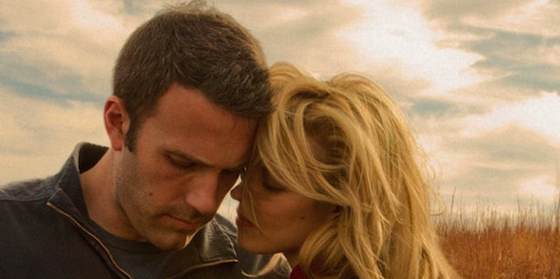- MENU
- HOME
- SEARCH
- WORLD
- MAIN
- AFRICA
- ASIA
- BALKANS
- EUROPE
- LATIN AMERICA
- MIDDLE EAST
- United Kingdom
- United States
- Argentina
- Australia
- Austria
- Benelux
- Brazil
- Canada
- China
- France
- Germany
- Greece
- Hungary
- India
- Indonesia
- Ireland
- Israel
- Italy
- Japan
- Korea
- Mexico
- New Zealand
- Pakistan
- Philippines
- Poland
- Russia
- South Africa
- Spain
- Taiwan
- Turkey
- USA
- BUSINESS
- WEALTH
- STOCKS
- TECH
- HEALTH
- LIFESTYLE
- ENTERTAINMENT
- SPORTS
- RSS
- iHaveNet.com: Movie Reviews

3 Stars
In the spirit of a Terrence Malick screenplay, certain rhetorical questions to be spoken in hushed voice-over present themselves regarding Malick's latest, "To the Wonder."
Can we ever see enough sunsets as filmed by Malick and his mighty cinematographer, Emmanuel Lubezki? Is serious spiritual yearning even worth attempting to capture in a series of moving images? And will Malick ever tire of the look of tall grass in the wind, bending this way and that, much as his characters conform themselves to the dictates and gentle yet unmistakable hand of the filmmaker himself?
Shot in Bartlesville, Okla., and in France, "To the Wonder" finds Malick pursuing a form of visual storytelling that is closer to chamber music, or symphonic rapture, than conventional film narrative. It skates along the edge of self-parody every second. Compared even with his previous feature, "The Tree of Life," this one's bound to frustrate the average meat-and-potatoes filmgoer looking for clear outlines and the usual dramatic builds.
Whatever. Minor Malick does not mean "To the Wonder" is a nothing. It is very much something: supple and a bit mad. What that something is -- well, you're the interpreter, as much as the writer-director in charge.
It depicts an Oklahoma man, played by Ben Affleck; a Ukrainian woman living in Paris, played by Olga Kurylenko; another woman back in Oklahoma, Rachel McAdams; and a fourth character, a Catholic priest stricken by a crisis of faith and purpose, played by Javier Bardem. Affleck's Neil, whom we see sampling soil for groundwater contamination in and around his hometown of Bartlesville, has met Marina (Kurylenko) in Paris. Romance has bloomed. "I'll go wherever you go," she whispers to us in voice-over, before they explore Mont St. Michel, on an island off the Normandy coast.
Where is "wherever"? Oklahoma. It's a strange new world to Marina and her 10-year-old daughter, no less so than the land Malick presented in his earlier film, "The New World." At one point in "To the Wonder," a classically Malickian transition glides from a shot of the shoreline off Normandy into a gliding frame of grasslands and power lines in the USA. The relationship soon sours. Marina, conceived as a twirly force of nature at odds with this land of big-box stores and cowboys, retreats with her daughter to France. Neil takes up with an old flame, a rancher (McAdams) who likewise loves to twirl in the wheat, among the bison.
The relationships come and go; Marina drifts back into Neil's life. Since her voice-overs from the start favor the past tense, we sense impermanence throughout. The film is a reverie, a memory reactivated, in a land of beauty despite the Sonic drive-ins and drab suburban cul-de-sacs.
I admire the picture, though little of "To the Wonder" gels in the usual way. Bardem's priest interacts only briefly with the other major characters; he's a state of troubled mind more than a dimensional being. The women competing for Neil's conscience and heart are largely nonverbal sprites, endlessly photogenic. The film is completely insular yet utterly open to everything in nature: the skies, the breeze, the unspoken connections between one human being and another. In this universe, when the musings (visual and verbal) are interrupted by a sign of everyday modernity -- when Marina Skypes with her faraway daughter, for example, or when someone says something as blunt as "My visa has expired" -- it's a shock to the system.
However elliptical, "To the Wonder" clearly speaks to, and from, Malick's own experience. It's conjecture, of course, but he appears to be atoning for past relational sins with his story of Neil, described as a taciturn but "incredibly loving" man. (It's not an unflattering self-portrait, to be sure.) "Weak people never bring anything to an end themselves. They wait for others to do it," Marina says in voice-over. Is Bardem's priest too weak to break up with God, or too strong to do so?
So, to get back to the rhetorical questions: Can we ever see enough sunsets as filmed by Malick? The answer is no. Is serious spiritual yearning even worth attempting to capture in a series of moving images? The answer is yes. Malick's images may run together, gliding in and out of windows, up quiet streets, in ways that induce a trancelike state (or, if you're not with it, sleepiness). But Malick is a true searcher, true to his preoccupations and definitions of soulful rhapsody. "To the Wonder" repeats its central motifs aplenty, yet you may find yourself thinking about life, and living, and love, while sorting through the movie. Even if it drives you nutz.
Oh, and: Will Malick ever tire of the look of tall grass in the wind? The answer is no. He will not.
MPAA rating: R (for some sexuality/nudity).
Running time: 1:52.
Cast: Ben Affleck (Neil); Olga Kurylenko (Marina); Javier Bardem (Father Quintana); Rachel McAdams (Jane).
Credits: Written and directed by Terrence Malick; produced by Nicolas Gonda and Sarah Green. A Magnolia Pictures release.
Copyright © Tribune Media Services, Inc.
'To the Wonder' Movie Review - Ben Affleck and Olga Kurylenko